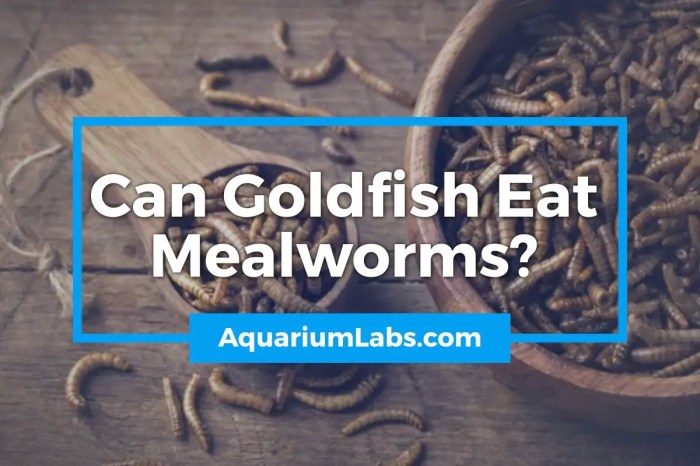Can goldfish eat mealworms? This question, often posed by curious fish owners, delves into the realm of unconventional pet nutrition. While goldfish are typically fed commercial flakes and pellets, the prospect of incorporating mealworms into their diet sparks intrigue. These small, protein-rich insects offer a potential nutritional boost, but their safety and suitability for goldfish remain under scrutiny.
This article explores the nutritional value, safety considerations, and practical tips for feeding mealworms to goldfish. We delve into the potential benefits and risks associated with this dietary addition, providing a comprehensive guide for informed decision-making.
Nutritional Value of Mealworms
Mealworms are a popular food source for various animals, including goldfish. They are a good source of protein, fat, and essential vitamins and minerals. Understanding their nutritional content can help determine if they are a suitable addition to your goldfish’s diet.
Nutritional Content of Mealworms
Mealworms are rich in protein, providing a significant source of amino acids essential for goldfish growth and development. They also contain healthy fats, including omega-3 fatty acids, which are beneficial for overall health. Mealworms are a good source of various vitamins and minerals, including:
- Vitamin B12: Crucial for red blood cell formation and nervous system function.
- Iron: Essential for oxygen transport and energy production.
- Zinc: Plays a vital role in immune function and wound healing.
- Calcium: Necessary for strong bones and teeth.
Comparison with Other Goldfish Foods
Mealworms offer a nutritional profile that compares favorably to other common goldfish foods. When compared to commercial goldfish flakes, mealworms provide a higher protein content and a more balanced fat profile.
| Food Type | Protein (%) | Fat (%) |
|---|---|---|
| Mealworms | 45-50 | 25-30 |
| Commercial Goldfish Flakes | 30-40 | 5-10 |
While flakes are convenient and readily available, mealworms offer a more natural and nutrient-rich alternative.
Benefits of Feeding Mealworms to Goldfish, Can goldfish eat mealworms
Feeding mealworms to goldfish can provide several benefits, including:
- Improved Growth: The high protein content in mealworms supports healthy growth and development, particularly for young goldfish.
- Enhanced Health: The essential vitamins and minerals in mealworms contribute to overall health and well-being, promoting a strong immune system and healthy organs.
- Increased Activity: The natural fats in mealworms can provide energy for increased activity levels, leading to a more vibrant and playful goldfish.
It is important to note that mealworms should be offered as a supplement to a balanced goldfish diet, and not as the primary food source.
While mealworms can be a healthy and occasional treat for goldfish, it’s important to consider their dietary needs. Just like with mealworms, it’s also worth exploring whether can goldfish eat carrots. Carrots, though, should be offered in moderation and in a form that’s easily digestible for your fish.
Ultimately, the best way to ensure your goldfish is getting a balanced diet is to consult with a veterinarian or an experienced aquarist.
Goldfish Species and Mealworm Consumption

Mealworms, while a nutritious and appealing treat for many fish species, are not universally suitable for all goldfish. Their size, dietary needs, and individual preferences play a significant role in determining whether mealworms are an appropriate addition to their diet.
Goldfish Species and Mealworm Suitability
The suitability of mealworms for goldfish species is largely determined by their size and dietary needs. Larger goldfish species, such as the common goldfish (Carassius auratus), the comet goldfish, and the fantail goldfish, are more likely to accept and benefit from mealworms due to their larger mouths and more varied diet.
These species often require a higher protein intake, which mealworms can provide. Smaller goldfish species, such as the veiltail goldfish, the celestial goldfish, and the lionhead goldfish, may find mealworms too large or difficult to consume.
Goldfish Species and Mealworm Acceptance
Some goldfish species, like the common goldfish and the comet goldfish, are known for their adventurous eating habits and may readily accept mealworms. Others, like the veiltail goldfish, may be more hesitant or require gradual introduction to this novel food source.
It’s essential to observe individual goldfish behavior and adjust feeding strategies accordingly.
Impact of Mealworms on Goldfish Behavior and Growth
The occasional inclusion of mealworms in a goldfish’s diet can have positive effects on their behavior and growth. The high protein content in mealworms can contribute to healthy muscle development and a more active, energetic fish. However, excessive mealworm consumption can lead to obesity and digestive issues.
It’s crucial to ensure that mealworms are offered as a treat or supplement rather than a staple food.
Last Recap: Can Goldfish Eat Mealworms
Ultimately, the decision to feed mealworms to goldfish hinges on a careful assessment of individual fish needs, potential risks, and the availability of alternative food sources. While mealworms can offer nutritional benefits, their inclusion in a goldfish’s diet should be approached with caution and moderation.
By understanding the intricacies of mealworm consumption, goldfish owners can make informed choices to ensure the health and well-being of their aquatic companions.